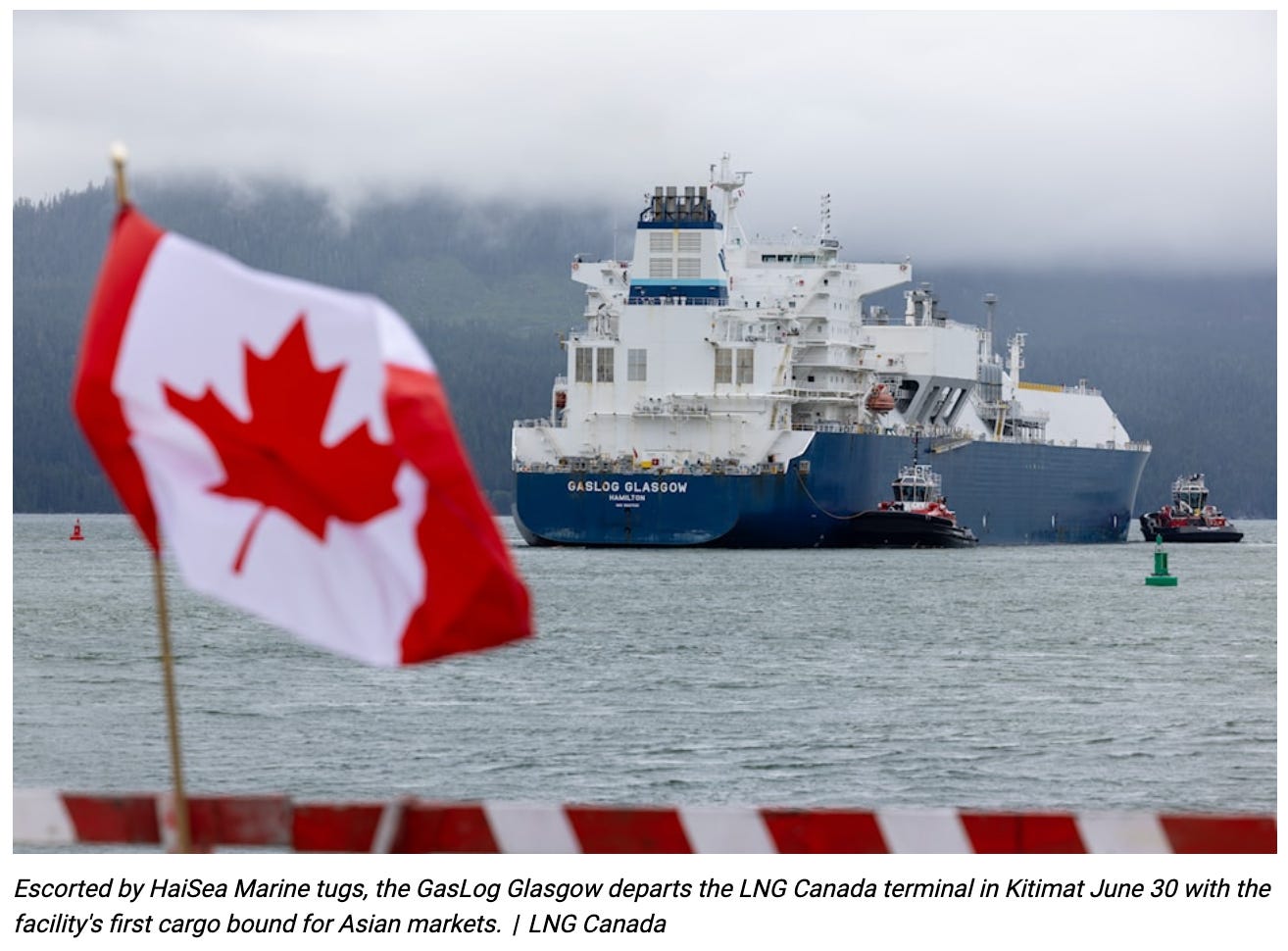Ships Ahoy
Canada joins the LNG exporter club. Carney "caves" on the DST. Pushback on climate policies. And there's still time for merch!
How’s this for an early national birthday present? On June 30, Canada officially became an LNG exporting nation, when the Gaslog Glasgow pulled away from the new terminal at Kitimat, British Columbia, bound for South Korea. LNG is natural gas that has been chilled into a liquid state so that it can be transported on marine vessels.
Until now, the only destination for Canadian natural gas has been to the U.S. via pipeline. As Prime Minister Mark Carney noted, the new LNG terminal is win-win-win for Canada, as it diversifies our trade, helps reduce emissions by substituting for coal in Asian markets, and was developed in full partnership with First Nations. There are two more LNG terminals currently under construction on the West Coast, with the next due to begin operations in 2027.
Meanwhile, a Norwegian company is looking to restart discussions for building an LNG terminal on the St. Lawrence at Baie Comeau. The project would also require construction of a pipeline to bring the gas from Alberta. A previous proposal was vetoed by both the Quebec government and Ottawa in 2021, but the changing geopolitical situation has made it a bit more attractive. There’s still a long way to go though, since environmental groups and political actors are already lining up in opposition.
Trade negotiations back on the table
Two days after U.S. President Donald Trump abruptly cancelled trade negotiations, blaming Canada’s decision to proceed with a digital services tax that would apply to major American tech firms such as Google and Amazon, the federal government dropped the tax — literally hours before the first payments were due.
People were quick to jump on Carney for bowing to American pressure, mocking his elbows-up/elbows-down vacillations as a “chicken dance”, and White House spokesperson Karoline Leavitt even boasted that Carney had, indeed, “caved.” But it isn’t clear what good options Carney had. The DST was a bad policy, as plenty of Carney’s critics conceded. It had been a large irritant with the Americans going back to the Biden administration, and Canada could instead have simply waited for the OECD framework on a standard policy for taxing digital policies to run its course. But the Liberals under Justin Trudeau chose to push ahead alone, leaving Canada exposed to American retaliation with very little leverage.
Whether or not Canada’s retreat is strategically effective or not remains to be seen; negotiations with the U.S. seem to be back on, though whether Carney got anything more in return for dropping the DST is not clear. On Thursday, Trump said that he would start writing letters to every trading partner that has not signed a trade deal with the U.S. The letters will set out the tariff rates that these countries will have to pay once the 90-day pause on “reciprocal tariffs” expires on July 9; meanwhile, the U.S. ambassador to Canada, Pete Hoekstra, said he would not commit to a deal by July 21, which was the date set for an agreement coming out of the G7 last month.
In her latest digital policy newsletter, Vass Bednar argues that Canada’s lack of leverage stems from the fact that the “data, cloud workloads, payment rails and ad exchanges all sit on infrastructure owned abroad.” As a result, our policies tend to be reactive, targeting the symptoms of the problem rather than targeting their ultimate cause, namely our lack of digital sovereignty.
If that’s true, then Jim Balsillie’s latest initiative couldn’t have been better timed. Last week, it was announced that he had donated $5 million to Wilfrid Laurier University for a digital governance initiative to “build economic resilience and digital sovereignty.”
Bad for the Environment?
The Environment ministers of Alberta and Ontario have written a joint letter to their federal counterpart asking Ottawa to repeal a handful of policies which, they argue, “undermine competitiveness, delay project development, and disproportionately harm certain regions without any quantifiable benefit to the natural environment.” These policies include a formal repeal of the carbon tax, the federal emissions cap, clean electricity regulations, and parts of the species at risk act.
This is part of a wider campaign against Trudeau-era climate policies. This past week, major Canadian auto manufacturers met with Carney to ask him to drop Ottawa’s EV mandate that would require one fifth of all cars sold in Canada next year to be zero-emission. Given that currently fewer than 9 per cent of all cars sold in Canada in 2025 will be EV, and with demand contracting, the manufacturers argue that the target is impossible to achieve without devastating the industry.
While the automakers say they are “cautiously optimistic” the mandate will disappear, the government is instead talking about bringing back subsidies for EV purchases, something that some observers say could end up costing in the billions and still not get us to the 20 per cent target.
Build Canada in the news
A Build Canada memo from Michael Serbinis for a “Discovery Visa” to attract top scientists and entrepreneurs got a shout out in this Globe and Mail oped from Daniel Bernhard of the Institute for Canadian Citizenship.
Build Canada Board Chair Dan Debow was on the Trevor Rose podcast to discuss energy corridors, tech ventures, and all sorts of ways to build Canada.
In The Hub, Build Canada CEO Lucy Hargreaves explains why she’s doubling down on Canada.
And finally, we are pleased to be partnering with The Icebreaker for Canada’s first defence tech hackathon. Scheduled for September 20 in Toronto, the goal is to “rapidly prototype dual-use tech that solves real operational gaps for the Canadian Armed Forces.” You can sign up here.
Merch Store pre-orders extended through the weekend!
For a limited time only, we’re opening a merch store. We worked with our friends at Province of Canada and Outway Socks to create limited edition Build Canada merch, including tees, zips, hats and socks.
Pre-orders close Sunday July 6 at 6pm ET.
What else we are reading
All federal obstacles to internal trade have been officially removed, according to Minister of Internal Trade Chrystia Freeland.
From Reason magazine: Quebec dairy farmers are blocking free trade in Canada.
A new report from Environics on “attachment and identity” in Canada suggests that there has been a “modest increase in the strength of the Canadian identity” over the past year, with 87% saying they feel “very” or “somewhat” attached to Canada.
“Canadian youth should have a universal gap year” reminded us of Dan Debow’s memo calling for a year of national service.
On X, BC Conservative leader John Rustad announced BuildBC, a campaign to “unleash our economy and deliver quality jobs for British Columbians.”
If you find this newsletter useful, the best thing you can do is share it or encourage others to subscribe. If you would like to get involved with Build Canada, you can click here.





Keep the EV mandate and our auto sector dies very quickly. Import cheap EV's from China and our auto sector dies very quickly. We are an integrated part of the North American auto sector which is moving back to ICE reducing overall demand for EV's. The larger question is can we build EV's competitively or should we double down on combining electrical and ICE technologies in hybrids which we can and do build here.
We still need to electrify our transportation sector, and moving to EVs is a large part of that. If we can’t mandate EVs, or subsidize them, can we at least import cheap ones from China?